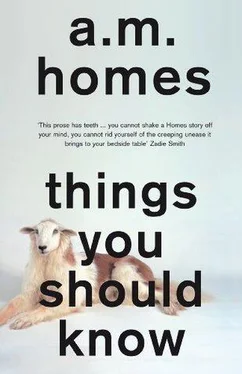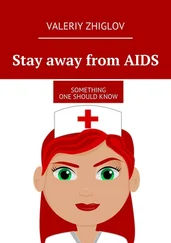A few days later a woman calls; she and her husband are people we see occasionally.
“Hi, how are you, how’s Tom?” I ask.
“He’s a fucking asshole,” she says. “Haven’t you heard? He left me.”
“When?”
“About two weeks ago. I thought you would have known.”
“I’m a little out of it.”
“Anyway, I’m calling to see if you’d like to have lunch.”
“Lunch, sure. Lunch would be good.”
At lunch she is a little flirty, which is fine, it’s nice actually, it’s been a long time since someone flirted with me. In the end, when we’re having coffee, she spills the beans. “So I guess you’re wondering why I called you?”
“I guess,” I say, although I’m perfectly pleased to be having lunch, to be listening to someone else’s troubles.
“I heard your wife was sick, I figured you’re not getting a lot of sex, and I thought we could have an affair.”
I don’t know which part is worse, the complete lack of seduction, the fact that she mentions my wife not being well, the idea that my wife’s illness would make me want to sleep with her, her stun gun bluntness — it’s all too much.
“What do you think? Am I repulsive? Thoroughly disgusting? Is it the craziest thing you ever heard?”
“I’m very busy,” I say, not knowing what to say, not wanting to be offensive, or seem to have taken offense. “I’m just very busy.”
My wife comes home from work. “Someone came in today — he reminded me of you.”
“What was his problem?”
“He jumped out the window.”
“Dead?”
“Yes,” she says, washing her hands in the kitchen sink.
“Was he dead when he got to you?” There’s something in her tone that makes me wonder, did she kill him?
“Pretty much.”
“What part reminded you of me?”
“He was having an argument with his wife,” she says. “Imagine her standing in the living room, in the middle of a sentence, and out the window he goes. Imagine her not having a chance to finish her thought?”
“Yes, imagine, not being able to have the last word. Did she try to stop him?” I ask.
“I don’t know,” my wife says. “I didn’t get to read the police report. I just thought you’d find it interesting.”
“What do you want for dinner?”
“Nothing,” she says. “I’m not hungry.”
“You have to eat something.”
“Why? I have cancer. I can do whatever I want.”
Something has to happen.
I buy tickets to Paris. “We have to go.” I invoke the magic word, “It’s an emergency .”
“It’s not like I get a day off. It’s not like I come home at the end of the day and I don’t have cancer. It goes everywhere with me. It doesn’t matter where I am, it’s still me — it’s me with cancer. In Paris I’ll have cancer.”
I dig out the maps, the guide books, everything we did on our last trip is marked with fluorescent highlighter. I am acting as though I believe that if we retrace our steps, if we return to a place where things were good, there will be an automatic correction, a psychic chiropractic event, which will put everything into alignment.
I gather provisions for the plane, fresh fruit, water, magazines, the smoke hoods. It’s a little-known fact, smoke inhalation is a major cause of death on airplanes.
“What’s the point,” she says, throwing a few things into a suitcase. “You can do everything and think you’re prepared, but you don’t know what’s going to happen. You don’t see what’s coming until it hits you in the face.”
She points at someone outside. “See that idiot crossing the street in front of the truck — why doesn’t he have cancer?”
She lifts her suitcase — too heavy. She takes things out. She leaves her smoke hood on the bed. “If the plane fills with smoke, I’m going to be so happy,” she says. “I’m going to breathe deeply, I’m going to be the first to die.”
I stuff the smoke hood into my suitcase, along with her raincoat, her extra shoes, and vitamin C drops. I lift the suitcases, I feel like a pack animal, a sherpa.
In France, the customs people are not used to seeing bald women. They call her “sir.”
“Sir, you’re next, sir. Sir, please step over here, sir.”
My wife is my husband. She loves it. She smiles. She catches my eye and strikes a subdued version of the super hero/body builder pose, flexing. “Cancer Man,” she says.
“And what is the purpose of your visit to France?” the inspector asks. “Business or pleasure?”
“Reconciliation,” I say, watching her — Cancer Man.
“Business or pleasure?”
“Pleasure.”
Paris is my fantasy, my last-ditch effort to reclaim my marriage, myself, my wife.
As we are checking into the hotel, I remind her of our previous visit — the chef cut himself, his finger was severed, she saved it, and they were able to reattach it. “You made medical history. Remember the beautiful dinner they threw in your honor.”
“It was supposed to be a vacation,” she says.
The bellman takes us to our room — there’s a big basket of fruit, bottles of Champagne and Evian with a note from the concierge welcoming us.
“It’s not as nice as it used to be,” she says, already disappointed. She opens the Evian and drinks. Her lips curl. “Even the water tastes bad.”
“Maybe it’s you. Maybe the water is fine. Is it possible you’re wrong?”
“We see things differently,” she says, meaning she’s right, I’m wrong.
“Are you in an especially bad mood, or is it just the cancer?” I ask.
“Maybe it’s you?” she says.
We walk, across the river and down by the Louvre. There could be nothing better, nothing more perfect, and yet I am suddenly hating Paris — the beauty, the fineness of it is dwarfed by her foul humor. I realize there will be no saving it, no moment of reconciliation, redemption. Everything is irredeemably awful and getting worse.
“If you’re so unhappy, why don’t you leave?” I ask her.
“I keep thinking you’ll change.”
“If I changed any more I can’t imagine who I’d be.”
“Well, if I’m such a bitch, why do you stay?”
“It’s my job, it’s my calling to stay with you, to soften you.”
“I absolutely do not want to be softer, I don’t want to give another inch.”
She trips on a cobblestone, I reach for her elbow, to steady her, and instead unbalance myself. She fails to catch me. I fall and recover quickly.
“Imagine how I feel,” she says. “I am a doctor and I can’t fix it. I can’t fix me, I can’t fix you — what a lousy doctor.”
“I’m losing you,” I say.
“I’ve lost myself. Look at me — do I look like me?”
“You act like yourself.”
“I act like myself because I have to, because people are counting on me.”
“I’m counting on you.”
“Stop counting.”
All along the Tuileries there are Ferris wheels — the world’s largest Ferris wheel is set up in the middle.
“Let’s go,” I say, taking her hand and pulling her toward them.
“I don’t like rides.”
“It’s not much of a ride. It’s like a carousel, only vertical. Live a little.”
She gets on. There are no seat belts, no safety bars. I say nothing. I am hoping she won’t notice.
“How is it going to end?” I ask while we’re waiting for the wheel to spin.
“I die in the end.”
The ride takes off, climbing, pulling us up and over. We are flying, soaring; the city unfolds. It is breathtaking and higher than I thought. And faster. There is always a moment on any ride when you think it is too fast, too high, too far, too wide, and that you will not survive. And then there is the exhilaration of surviving, the thrill of having lived through it and immediately you want to go around again.
Читать дальше












